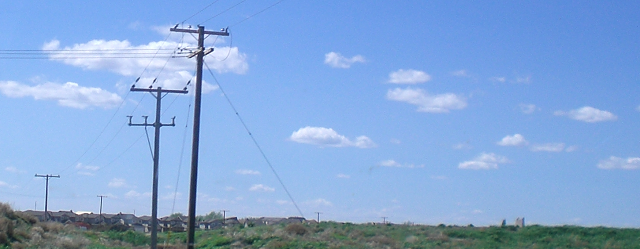Hello! This is my first post on Vision of Earth. Glad to be here. On November 9th & 10th, SCIC (Saskatchewan Council for International Cooperation) hosted an event in Saskatoon called Harvest and Hunger (introduced in our earlier post: Harvest and Hunger: Brainstorming the future of the world food system). SCIC is an umbrella organization that represents […]
Tag: Economics
Harvest and Hunger: Brainstorming the future of the world food system
Harvest and Hunger The Saskatchewan Council for International Cooperation is hosting an event in Saskatoon on November 10th called Harvest and Hunger. The event sets out to answer three questions: Who controls the world’s food? Who has power in the global food system? Who doesn’t? What are people doing – both in Saskatchewan and around […]
Ben’s Interview on Radio CKUT 90.3 FM
Ben Harack was interviewed on the Ecolibrium radio show on CKUT in Montreal. Topics were Moving Planet, Saskatchewan’s sustainability, and peer-based cross-disciplinary efforts towards sustainability.
How much would it cost to end extreme poverty in the world?
Ending extreme poverty in twenty years is very feasible if the developed world delivers on their promises. The United States alone could end world poverty with a fraction of their military budget.
Story Of Afghanistan That Everyone Should Know
The US sent huge sums of money to support freedom fighters in Afghanistan to fight the Soviet Union during the 1980’s.
Wage reduction through inflation
Inflation means that a dollar is worth less at the end of a year than at the beginning. Real wages go down when raises are not higher than inflation rates.
Voted for Koch on the Corporate Hall of Shame
I voted for Koch Industries in the Corporate Hall of Shame. They push toxic political and economic agendas that hurt the world.

Opportunities and perils of natural gas usage on the road to renewables
Our increasing reliance on natural gas brings with it both opportunities and dangers during the shift towards renewable energy. This issue deals with some major issues regarding natural gas deployment in industry, power generation, food production, and heating.
Applying free market ideas to politics: How fares the US?
We apply the ideals of a free market economy to politics and realize that US politics is an extremely unhealthy market dominated by a pair of monopolistic ‘sellers’ who deliberately bar any third party from effectively challenging them.
John Klein: Social involvement and sustainability in Regina, Saskatchewan, and Canada
John Klein is a notable blogger and community activist in Regina, Saskatchewan. Here he answers our philosophical and practical questions about the most important issues facing our society today, and what each of us can do about them.

Capitalism’s Labour Transitions – An Argument for Social Welfare
Capitalist labour transitions are a heavy burden on the working class and society in general, but they are also one of the cornerstones of progress. We can solve this problem in an economically practical as well as morally and socially desirable through the creation of a strong social welfare system.

A renewed look at 2010, a sustainable vision for 2011
Here we review major renewable energy topics from 2010 and then turn towards analyzing energy issues for 2011 and beyond.
Time Perspectives, Global Stability, and a Future Worth Living
How do we end the era of suicide bombers? We must give them a future that is worth living for. Currently we are destroying their futures, leaving them with only their hope of taking a shortcut to heaven.
How to argue with trolls and extremists
How to argue against those who will never change their mind, and who will undermine your attempts to discuss things meaningfully. These are our best tips for how to deal with trolls and extremists.
Demand side management to help build a renewable power grid
Demand side management helps make our power grid more cost-effective and aids in the transition towards renewable energy. It can also be considered as a very green policy on its own, as it reduces the amount of power we need to produce, and thus our impact on the environment.
Science denial: Vaccines, vitamins and GMOs
Michael Specter delivered a clear and powerful message in his talk at TED in 2010. Vaccines save lives, yet people fear them. GMOs are primarily opposed for reasons unrelated to the method of their construction.
The regulatory battle over coal fly ash heats up
The coal industry has had a history of lobbying against a hazardous waste label for fly ash. Fly ash is toxic enough that the EPA mandated decades ago that it be captured and stored rather than emitted into the atmosphere.
Jeffrey Sachs on the high price of ignoring poverty
We can end poverty in two decades. HIV/AIDS has reached a steady state in the world. Military spending is 25 times aid spending. We can achieve peace through shared prosperity.
How the common explanations for poverty are incorrect
The common ideas that purport to explain the fact of poverty are in fact not the primary causal factors of poverty.
Types of hydroelectric power: How do the dam things work?
Hydroelectricity, or ‘hydro’, is generated from the energy in the water cycle of the earth. The sun evaporates water on the surface of the earth, causing it to rise up to form clouds. Clouds eventually form droplets, which then rain, snow, or hail down to the surface. Water on the surface flows downhill until it evaporates again. During this time it may become trapped in glaciers, lakes, ponds, puddles, or the ocean. Driven by the sun, the water cycle is a truly renewable resource.